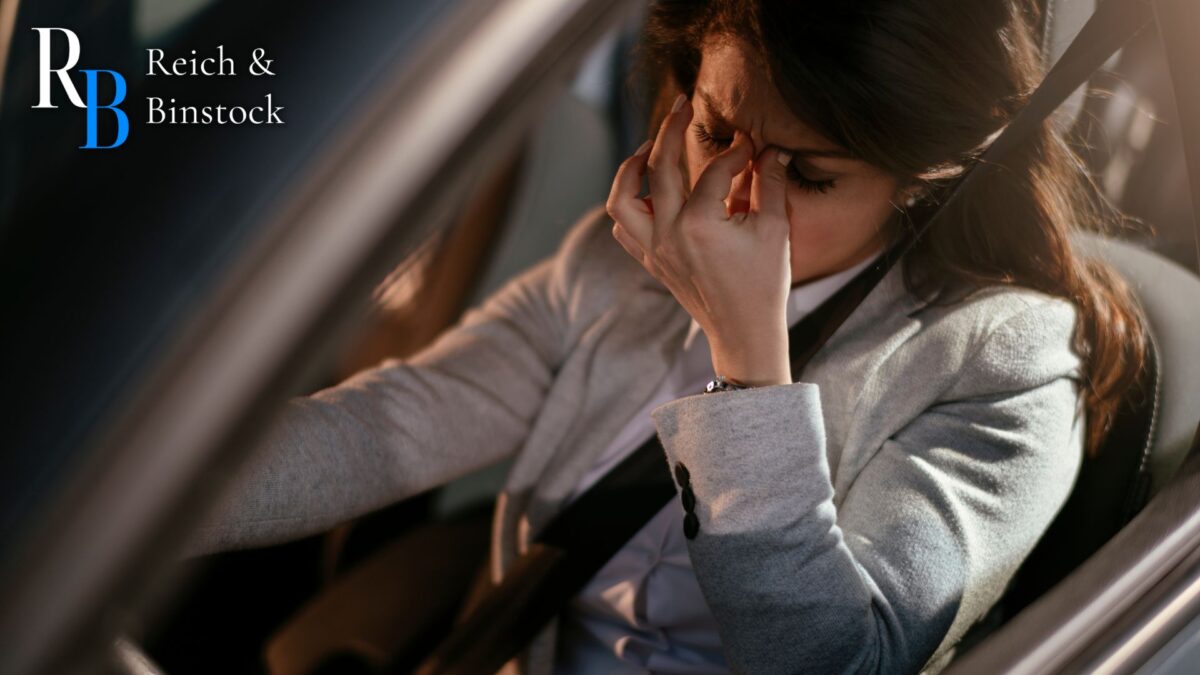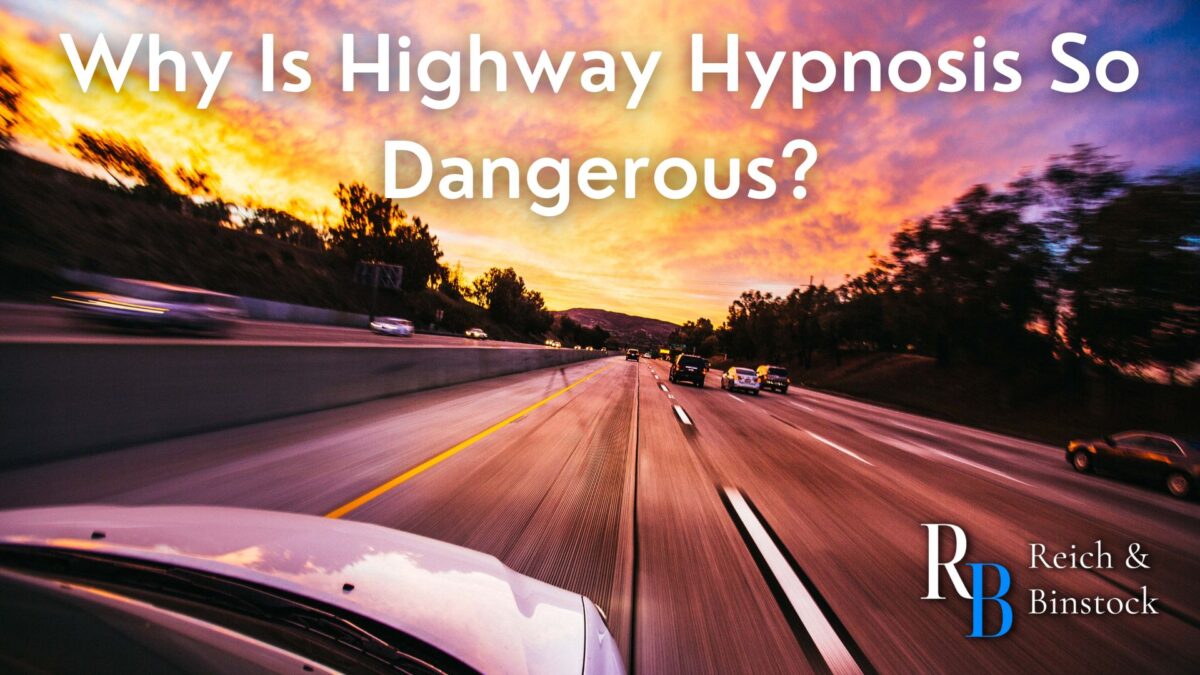If you’ve ever driven over long periods and lost track of time, this experience is called highway hypnosis. Drivers often deal with highway hypnosis, or white line fever, when they drive the same route or long distances.
When drivers lose focus, they can be more susceptible to causing car accidents due to their inattentiveness. This lack of focus in drivers makes them unable to react quickly to sudden changes in traffic or road conditions.
If you were injured in an accident caused by another driver’s white line fever, you could be entitled to compensation. Contact the Houston attorneys at Reich & Binstock today to learn more about your legal options.
What Is Highway Hypnosis?

Existing research compares highway hypnosis to driving without awareness or attention. It’s also called white line fever since many drivers notice blurring white lines when they experience this trance-like state. Driving for long periods of time or on familiar roads can lull a driver into a hypnotic state. While in this state, drivers will continue operating their vehicles but unconsciously.
When driving the same routes, drivers can switch their brains to autopilot since they’re so familiar with the roadways. The same can happen when people drive for long distances without breaks. It can also happen from lack of sleep, which is why it usually goes along with drowsy driving. People that drive while tired cause over 100,000 motor vehicle accidents annually. These result in around 800 deaths and 50,000 injuries, according to the National Safety Council.
Automatism vs Highway Hypnosis
Automatism and highway hypnosis are similar in that a driver operates their vehicle in a trance-like state. A person driving with road hypnosis will be less alert, which usually happens when traveling a long distance. People often experience highway hypnosis when driving drowsy or traveling monotonous roads.
While they are similar, some differences exist between automatism and highway hypnosis. Automatism is used in criminal law to defend those who have made poor decisions. This could be due to a medical condition, sleepwalking, or taking drugs. When a person is facing charges for causing an accident, their defense attorney can use automatism as a defense. They do this by stating they suffer from sleepwalking and had no idea what they were doing at the time. This defense is common for those facing DUI charges.
Both automatism and highway hypnosis occur when a person is unaware of their actions. While automatism is a recognized form of defense in legal cases, the state does not acknowledge highway hypnosis as one.
Drowsy Driving and Highway Hypnosis
Drowsy driving is similar to highway hypnosis since both involve brain inattention. In both scenarios, parts of the driver’s brain aren’t fully aware or awake, which slows down reaction time. If you’ve been driving for several hours and can’t remember the last few miles, you’re probably experiencing highway hypnosis.
A kinesiology professor at the University of Michigan, Sean Meehan, has said that tiredness alters the brain to the point where certain information cannot be processed. The center of the brain consciously processes information. But when we’re tired, there becomes a barrier keeping it away from the brain’s center. As we drive or do other things while we’re tired, the brain unconsciously processes that information, so we don’t even realize what we’re doing. This is how drivers can continue operating their vehicles without their conscious mind recognizing the action. This trance-like state is that hypnotic feeling drivers experience when they’re tired or driving long stretches of road.
Tired drivers are more at risk of highway hypnosis, especially if it’s a boring road with no turns or stops. Traveling open highways can lull a driver into highway hypnosis since there is nothing to keep their attention. The brain almost switches to autopilot after a period, and the subconscious mind takes over. You are more likely to fall into highway hypnosis when you’re experiencing driver fatigue or traveling roads you frequent.
Why Does Highway Hypnosis Happen?

Driving is one of the many tasks that people perform daily. We drive to work, home, etc., so often that it becomes second nature. The more people drive, ride bikes, and do other tasks consistently, the more they begin to do them without much thought, which is called automaticity. Many researchers agree that highway hypnosis is caused by automaticity.
Highway hypnosis can often be confused with distracted driving. However, the two are different because one action is done consciously while the other is done subconsciously. Distracted drivers choose to get on their cell phones or eat behind the wheel. They have a choice not to engage in distracting behaviors. However, highway hypnosis is an unconscious action that the driver has no idea is happening.
What Causes Highway Hypnosis?
Drivers are more at risk of highway hypnosis if they’re driving long, monotonous roads over a long period of time. After driving long, boring roads, the driver may notice blurring white lines and a lack of brain alertness. Long and monotonous roads can lull the driver into the hypnotic state associated with highway hypnosis.
Driving hypnosis doesn’t always happen to those traveling long distances. People driving the same routes daily have also experienced highway hypnosis. When drivers are familiar with their routes, it can lead to road hypnosis due to the mental predictability of the roadways. While the driver’s eyes may still be on the road, their mind is elsewhere.
Highway hypnosis is very common, and any driver can or has experienced it. Whether you’re driving a long, dull road trip or taking the same route to work, it can happen to anyone. Once you’ve reached that trance-like state, your mind may not register another vehicle switching lanes, a changing speed limit, or a road obstacle as quickly as if you were totally alert.
What Does Highway Hypnosis Feel Like?
Drivers often describe driving with highway hypnosis as driving as if they were in a dream or trance-like state. They may not be completely aware of their surroundings or their actions. Highway hypnosis can often feel as if you’re driving on an auto-pilot.
Drivers experiencing highway hypnosis may feel tired, have difficulty focusing, or feel detached from their surroundings. Once a driver has reached their destination, they may have difficulty remembering their drive or other details about their trip.
Symptoms of highway hypnosis include:
- Decreased reaction time
- Glassy eyed stare
- Lack of concentration
- Missing exits
- Snapping out of a trance-like state
- Unconsciously drifting into the next lane
- Daydreaming
Why Is Highway Hypnosis Dangerous?
When drivers travel over long distances and don’t take frequent breaks or get a good night’s sleep, they can be susceptible to highway hypnosis. Highway hypnosis is dangerous because the driver has lost focus on what they’re doing as well as the vehicles around them. When drivers begin to experience highway hypnosis and don’t heed the warning signs, they can put their passengers and other cars at risk.
How Can It Lead to a Car Accident?
Drivers can often get in a hurry while they’re traveling or fail to notice the signs related to highway hypnosis. When they ignore symptoms of highway hypnosis, they’re essentially ignoring the well-being of the other drivers and passengers on the road. If a driver has reached the point of highway hypnosis, it’s almost as if they’re driving with their brain on cruise control, which keeps them from reacting quickly to sudden changes in traffic or other road hazards.
Any time you’re driving with limited awareness, it can lead to an accident. Truck drivers are susceptible to experiencing this since they drive over long periods with few breaks and stops. When a truck driver falls victim to highway hypnosis, the results can be catastrophic. Victims should call a Houston truck accident lawyer as soon as possible.
In 2013, an engineer driving a commuter train in New York City stated he lost awareness moments before the train derailed. When the driver experienced a momentary lapse in awareness, a curve approached, but he couldn’t react quickly enough. Many believe that he experienced highway hypnosis. Unfortunately, four people died, and over 60 sustained injuries.
Listed below are some ways that highway hypnosis can lead to car accidents.
- Slower reactions: When a driver is experiencing highway hypnosis, their reaction time to other vehicles, changes in traffic, and road conditions are slower, similar to when a driver is under the influence.
- Poor choices: Highway hypnosis can cause drivers to make sudden lane changes or commit other traffic violations since they’re not paying attention to what’s happening around them.
- Lack of awareness: Drivers with white line fever may be so focused on the car in front of them that they aren’t aware of hazards or oncoming traffic.
Accidents caused by highway hypnosis can be dangerous and cause serious injury to those involved. Since the driver isn’t fully aware, they don’t have time to slow down. If you suffered injuries from an accident caused by highway hypnosis, you could pursue financial compensation for your injuries. To discuss the legal options available to you, call the Houston car accident attorneys at Reich & Binstock to schedule a free consultation.
How to Avoid Highway Hypnosis

If you notice that your attention has begun to wander, you can’t recount the last several miles, or other related symptoms, it’s essential to take the proper steps to avoid causing car accidents. We’ll explain the best ways that you can prevent it and stay alert behind the wheel.
Avoid Driving for Long Periods of Time at Night
Driving for an extended period of time is one of the most common causes of driving hypnosis. In fact, the National Highway Traffic Safety Administration (NHTSA) found that white-line fever is more likely to happen between midnight and 6:00 am when the body is usually sleeping. Driving late at night can also cause a driver to fall asleep at the wheel, especially when the roadways are dull, and there isn’t much traffic. While you may think you can just drink coffee or other caffeinated beverages, it usually isn’t enough to keep you as alert as you need to be while driving.
Maintain Good Posture
Another way to avoid it is driving in an upright seat. This can help you keep a good posture, preventing you from falling into a relaxed state.
Try a Different Route
If you travel the same long route to work or another place you frequent, you can change up your drive. Taking different routes can help you avoid it by changing up the same old scenery you see daily. You can switch driving on the highway to driving through town. It might take you longer, but it will be a nice change of atmosphere. You can also try taking different exits on the interstate or finding a different route on the highway if you live in a big city and want to avoid traffic jams, like those in Houston.
Change Your Environment
If you begin to feel the onset of highway hypnosis but cannot take a break, you can try changing your environment. Below are some quick fixes that can help you stay alert behind the wheel.
- Roll your window down. If you’re traveling on the interstate, the rush of air can help wake you up. Also, the cooler air can help increase your awareness and prevent you from falling asleep if it’s cold outside. If it’s too hot for that, blast your air conditioning! Warm air can cause drowsiness, so cool off for a minute if you need to wake up.
- Play fun, upbeat music. Slow music or quiet podcasts can increase your drowsiness and inattentiveness. If you’re about to drive on a long trip, make a playlist of fun, upbeat music to keep you awake.
- Switch off cruise control. Paying attention to your speed can help you stay alert and keep your brain from switching to autopilot mode.
Were You Injured in an Accident Due to Highway Hypnosis?
All drivers are at risk of experiencing highway hypnosis. However, remaining alert and aware of other drivers on the road can help you avoid an accident. However, car accidents caused by inattentiveness often happen quickly, not allowing you to prepare for impact or get to safety. You could seek compensation if you were injured in a car accident caused by a driver suffering from this state.
It can be challenging to prove that the other driver was experiencing road hypnosis. Seeking legal representation from a knowledgeable Houston car accident attorney at Reich & Binstock is important.
Damages in a Highway Hypnosis Accident
The personal injury attorneys at Reich & Binstock have recovered millions in financial compensation for Houston residents involved in car accidents. If you suffered injuries in an accident, you could receive damages for the following:
- Lost wages
- Medical expenses, both past and future
- Property damage
- Counseling
- Physical therapy
- Loss of consortium
- Pain and suffering
- Emotional distress
You could recover damages for funeral and burial expenses, loss of benefits, and more in the event of wrongful death. If your loved one died in a car accident, discuss your legal options with a Houston wrongful death attorney today.
Contact the Houston Car Accident Lawyers at Reich & Binstock Today

When injured in an accident, Reich & Binstock can evaluate your case and determine whether you have a claim. If you have a case, your car accident attorney will represent you in any legal proceedings. We will also work with the at-fault driver’s insurance company on your behalf.
For over 30 years, Reich & Binstock have represented Houston residents. We handle cases involving car accidents, personal injury claims, defective product claims, and more. If you need the best legal representation for your car accident lawsuit, call Reich & Binstock at 713-622-7271 today.













